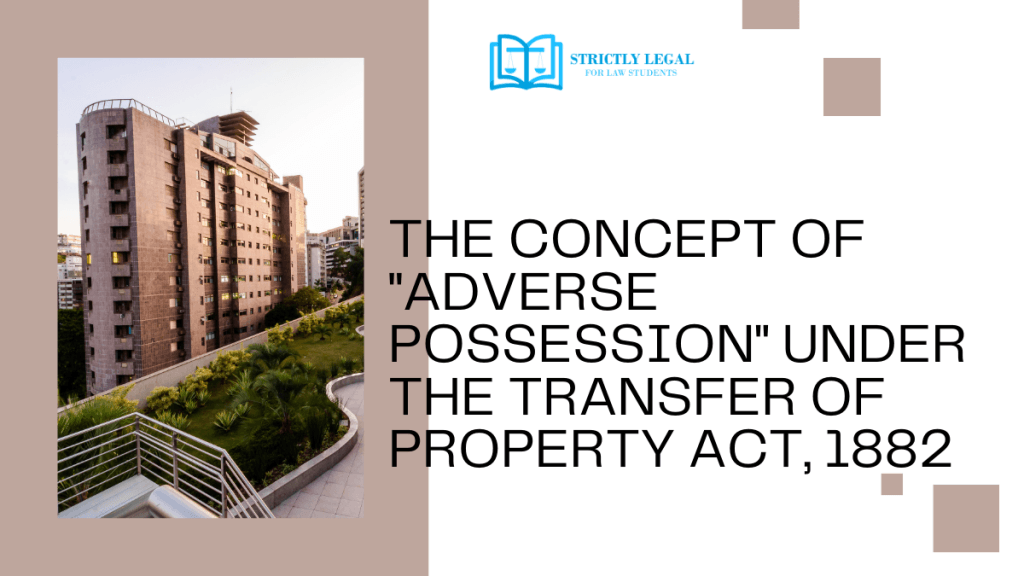Adverse possession is a legal doctrine that allows an individual to claim ownership of a property after possessing it for a certain period without the consent or permission of the original owner. While the Transfer of Property Act, 1882 does not explicitly address the concept of adverse possession, the principles of this doctrine are relevant and are governed by the provisions of the Limitation Act, 1963. Adverse possession plays a critical role in property law, particularly in situations where ownership rights are contested, or the title of property is unclear.
Table of Contents
What is Adverse Possession?
Adverse possession refers to the occupation of a property by someone who is not the legal owner, under the following conditions:
- Exclusive and Continuous Possession: The person must occupy the property without interruption for the statutory period.
- Hostile Possession: The possession must be without the consent of the original owner.
- Open and Notorious Use: The person must use the property in a way that is obvious to the rightful owner and the general public.
- Adverse to the Title of the Original Owner: The possessor must treat the property as their own, to the exclusion of the rightful owner.
In India, the period required for claiming adverse possession is 12 years for private land and 30 years for government land, as stipulated by the Limitation Act, 1963.
Adverse Possession under the Transfer of Property Act, 1882
The Transfer of Property Act, 1882 primarily deals with the transfer of ownership and rights related to property, including the sale, mortgage, lease, and gifts. Though the Act does not provide a direct reference to adverse possession, it does touch upon certain related aspects in the context of the transfer of property, particularly regarding ownership and rights over property. The following provisions are relevant when considering the concept of adverse possession:
Section 27 of the Limitation Act, 1963
While not part of the Transfer of Property Act, the Limitation Act, 1963, is crucial in determining the period required for adverse possession. Section 27 of the Limitation Act specifically states that if a person has been in continuous possession of the property for 12 years (for private land) or 30 years (for government land), they can claim ownership of the property through adverse possession. This section overrides the Transfer of Property Act by providing a concrete timeline for how long possession needs to be uninterrupted before ownership can be legally claimed.
Effect on Transfer of Title
Under the Transfer of Property Act, if a person is in adverse possession for the requisite period, they can acquire the title to the property, effectively transferring ownership from the original owner to the possessor. Section 27 of the Limitation Act, 1963, specifically relates to how adverse possession impacts the transfer of title. Even though the Transfer of Property Act allows for legal transfers of ownership through sale, lease, or mortgage, it does not preclude a transfer of ownership that occurs through adverse possession if the possessor has met the criteria.
The Role of Transfer in Adverse Possession Claims
Although adverse possession does not typically involve a formal transfer of property, the possession of land can be seen as an informal transfer under the principles of adverse possession. The Transfer of Property Act provides mechanisms for formal transfers, but when adverse possession is claimed, the original owner’s title may be extinguished through continuous, unauthorized possession. The right of ownership is thus transferred from the original owner to the adverse possessor, even without a written agreement or formal transfer.
Doctrine of Estoppel and Adverse Possession
In property law, the doctrine of estoppel prevents a person from denying a previous statement or action. In the context of adverse possession, once a person has occupied a property for a significant period under adverse conditions (i.e., without the owner’s consent), the original owner may be estopped from asserting their ownership claim if they fail to take action within the legal time frame. The Transfer of Property Act does not explicitly address estoppel in the context of adverse possession, but courts often apply this principle in property disputes.
Requirements for Adverse Possession in India
To successfully claim adverse possession under Indian law, several legal criteria must be met:
Continuous Possession: The possessor must occupy the land continuously for the entire statutory period. Intermittent or temporary occupation is insufficient to claim ownership through adverse possession.
Exclusive Possession: The possessor must have exclusive control over the property, meaning the possession must be undisturbed and not shared with the original owner or others.
Hostile Possession: The possession must be adverse to the interest of the rightful owner, meaning it is without their consent. The possessor treats the land as if they own it, excluding the rightful owner from exercising any control.
Knowledge of Possession: The rightful owner must be aware (or should have been reasonably aware) of the adverse possession. However, a mere lack of knowledge on the part of the original owner does not prevent the possessor from claiming ownership once the required time period has elapsed.
No Acknowledgement of Ownership: The possessor must not acknowledge the original owner’s title or consent to their possession. If the possessor acknowledges the original owner’s rights during the statutory period, the clock for adverse possession resets.
Precedents on Adverse Possession
In K.K. Verma v. Union of India (1954) the court ruled that the requirement of continuous and uninterrupted possession for the statutory period is paramount in adverse possession claims, and that a person’s possession must be hostile and not by mere permission of the original owner.
in L. N. Aswathama v. P. N. Vishwanath (1990) the court emphasized that adverse possession could not be claimed if the property was held with the owner’s consent, even if it had been for many years.
In R. v. Prem Singh (2011) This case clarified that the possession must be open, peaceful, and without any claim of ownership from the original owner to be valid under adverse possession laws.
Conclusion
While the Transfer of Property Act, 1882 does not explicitly discuss adverse possession, the concept is crucial in Indian property law, especially when considering the transfer of ownership through the Limitation Act, 1963. The principles of adverse possession allow a person to acquire ownership of property by occupying it continuously and without permission for the requisite period. It is important for property owners to be vigilant about their land and take action against unlawful possession within the statutory period, or risk losing their rights over the property. Adverse possession serves to balance the rights of property owners with those of individuals who may have occupied land for a long time and treated it as their own.

Law student.
Turning legal insights into engaging narratives.





